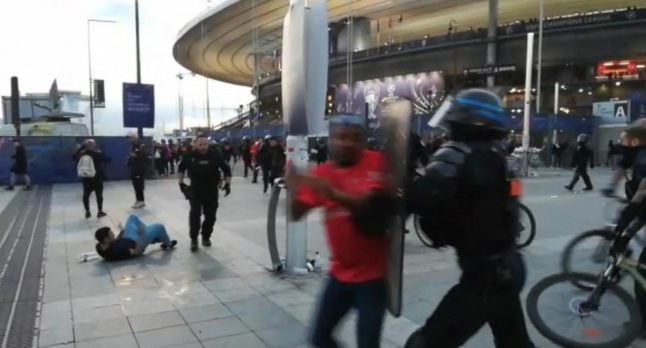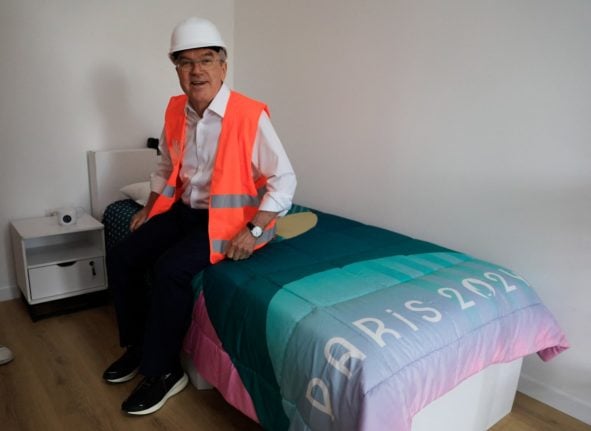Fans were pepper sprayed, tear gassed, hit with truncheons and wrestled to the floor by French police during Saturday’s Champions League final. Some even allege that guns were pointed at fans.
Liverpool supporters seemed to have been on the receiving end of much of this abuse.
“I’ve just endured one of the worst experiences in my life. Horrendous security and organisation putting lives at risk,” said MP for Liverpool West Derby, Ian Byrne, who was at the match.
International commentators appeared shocked by the policing methods. The British Ambassador to France has demanded that UEFA launch an investigation into the chaos. And Liverpool Football Club have also requested a formal inquiry.
But for those of us living in France, these kinds of scenes are nothing new. Investigative website Mediapart described the crowd control at the match as “a failure of French public authorities which punctuates many years of repressive, inappropriate and often violent policing.”
Journalist Ilyes Ramdani tweeted: “French savoir-faire is spreading. After the banlieues, it was the Yellow Vests, then protests of all kinds, now Liverpool supporters have discovered the French police – with its gas and lies.”
Philippe Marlière, a professor of French politics at University College London said “the whole world was able to see a French police force that is as violent as it is incompetent at the Stade de France.”
“Many human lives were threatened by the action of the police,” he continued.
French law enforcement is, after all, hardly known for its light touch.
During the Yellow Vests protests in 2018/19, dozens of people lost eyes as police fired non-lethal ammunition and tear gas canisters at demonstrators. More than 300 people suffered head injuries including fractured jaws and skulls, after receiving blows from French law enforcement officers. At least two people lost their lives after altercations with police.
When the police raid rave parties, injuries are common. During a Fête de la Musique event in 2019, a violent police charge at revellers on the banks of the Loire river led dozens to fall into the water. Steve Maïa Caniço, a 24-year-old who couldn’t swim, subsequently drowned.
In 2020 four French police officers were charged with beating up a black French music producer, in what most observers described as a racist and disproportionate use of force. Those who closely followed the Affaire Théo, a 2017 incident when a young black man from Seine-Saint-Denis was beaten up and anally raped with a truncheon, would not be shocked by this later incident.
The bulldozing of migrant camps, pepper spraying of peaceful environmental protestors and deployment of armed riot police to even the smallest of protests is commonplace.
Utilisation de gaz lacrymogène sur les militants d’Extinction Rebellion qui bloquaient pacifiquement le Pont de Sully pic.twitter.com/MtULrfRQTF
— Matthieu Brandely (@m_brandely) June 28, 2019
The heavy-handed approach to crowd control at a football event in France is not unprecedented either. Tear gas was fired on multiple occasions during the 2016 Euros.
Investigative journalist Valentin Gendrot published a book called Flic in 2020. It was the culmination of almost six months spent undercover, posing as a police officer within a Paris police station to get an insight into the country’s law enforcement culture.
“What astonishes me is at what point they feel untouchable,” he writes.
“As if there’s no superior, no surveillance by the hierarchy, as if a police officer can choose – according to his free will or how he is feeling at that particular moment – to be violent or not.”
“In my commissariat there were racist, homophobic and macho comments every day. They came from certain colleagues and were tolerated or ignored by others.”
The French Interior Minister has blamed travelling English fans for the chaotic scenes yesterday – as did UEFA. But many argue that the reaction of stadium security and the police greatly exacerbated the situation.
Jean-Luc Mélenchon, a far-left rival of President Emmanuel Macron, told BFMTV that there had been “a complete failure of the police strategy.”
“The people were treated as they usually are during any kind of demonstration. We can’t continue like this,” he continued.
The Stade de France venue where most of the violence took place is set to host matches for the Rugby World Cup in 2023 and a number of Olympic events in 2024.
Far-right leader Marine Le Pen told RTL that the events of Saturday showed that “France is no longer able to organise major events without things degenerating.”
UEFA said they were “sympathetic” to the fans affected and would review the situation together with local police and authorities.
For Ronan Evain, executive director of the Football Supporters Europe network, the events “raises the question of France’s ability to organise events of this size”.
“We continue to see the same organisational strategy that have already failed in the past. There is a very strong need to modernise the approach to securing these events,” he told AFP.
His organisation issued a statement saying that “Fans at the Champions League final bear no responsibility” for the “fiasco”.



 Please whitelist us to continue reading.
Please whitelist us to continue reading.
Member comments